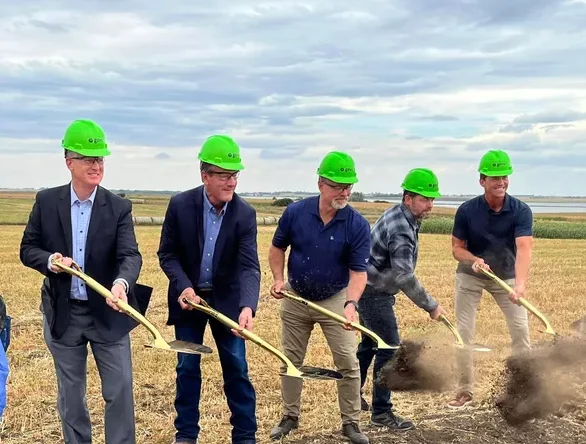
Sustainable Jet Fuel Company Contributes $167K in Defense of Carbon Pipeline Law
A company aiming to produce aviation fuel from ethanol in South Dakota has contributed $167,000 to defend a new carbon dioxide pipeline law that voters could be asked to reject in November.

Lt. Gov. Larry Rhoden (second from left) breaks ground with officials during the Gevo presentation in Lake Preston on Thursday.
The company, Gevo, made the contribution to a ballot question committee called Protect South Dakota’s Ag Future. The contribution was not affected by any limits, because there are no limits on contributions to ballot question committees in South Dakota.
Voters didn’t know about the contribution prior to the June 4 primary election, even though the pipeline law was a major issue in some legislative primary races.
Some opponents of the new pipeline law, including Ed Fischbach, of rural Aberdeen, allege that the reporting of the contribution was timed to avoid publicity before the primary.
“It looked like they were trying to hide it,” Fischbach said.
The chairman of Protect South Dakota’s Ag Future is Walt Bones, who formerly served as South Dakota’s secretary of agriculture. He did not specifically address the allegation but did describe the sequence of events affecting the timing of the contribution’s disclosure.
Bones said Gevo authorized the contribution on May 13, but the money had not reached the committee by the time of its required May 20 pre-primary campaign finance report. So that report showed no contributions. After the contribution arrived on June 3, the committee disclosed it in a supplemental campaign finance report filed on June 4, the day of the primary election.
Bones said the money is being used to inform voters about the importance of a proposed carbon dioxide pipeline and the benefits of the new pipeline law. Public records on file with the Federal Communications Commission show the effort has included television advertising.
“This committee is about more than just the pipeline. That’s just part of it,” he said. “We see this whole debate as a threat to all value-added agriculture going forward.”
Kent Hartwig is the treasurer of Protect South Dakota’s Ag Future and director of state government affairs for Colorado-based Gevo, which wants to build its Net-Zero 1 sustainable aviation fuel plant at Lake Preston. The plant would contribute carbon dioxide to a pipeline proposed by another company, Iowa-based Summit Carbon Solutions. Hartwig said Gevo wants to educate South Dakotans about the pipeline’s importance to the future of the farm economy.
“In addition to our work bringing people together, Gevo has invested dollars in trying to get the message out to ensure South Dakota’s agriculture industry remains competitive and open to opportunities,” he said in a statement to South Dakota Searchlight.
The Legislature and Gov. Kristi Noem adopted the new pipeline law last winter. It includes protections for landowners and local governments. It also preserves a path toward regulatory approval for Summit and its proposed $8.5 billion pipeline.
The pipeline would capture carbon dioxide from the aviation fuel plant and dozens of existing Midwestern ethanol plants, and transport the carbon to an underground storage site in North Dakota. Federal tax credits available for the project are intended to incentivize the removal of heat-trapping carbon from the atmosphere. Critics have pointed out that the sequestration site is near oilfields, and carbon dioxide can be injected into aging oil wells to make them more productive.
Some opponents of the pipeline, including some landowners along the route, view the new state law as a concession to Summit. The law does not prevent the company from using eminent domain, which is a legal process to gain access from unwilling landowners.
“Everything in that bill is stuff landowners and counties already could have — or did — negotiate with Summit,” Fischbach said. “Summit got everything they wanted in that bill. There was no compromise.”
Opponents of the law formed a ballot question committee called SD Property Rights and Local Control Alliance. They collected about 28,000 petition signatures — over 10,000 more than the number required to refer the law to the Nov. 5 election — and submitted the signatures last month to the Secretary of State’s Office. The office is reviewing the validity of the petition and signatures.
The committee raised about $11,000 from 21 individual contributions, according to its most recent campaign finance report.
Another controversial aspect of the new pipeline law is its language regarding the Public Utilities Commission’s authority to override local “setbacks” — laws mandating minimum distances between pipelines and existing features such as homes and businesses.
State law formerly said the commission could choose to override local setbacks while considering a permit for a carbon pipeline. The new law says a permit from the commission automatically overrides local setbacks unless the commission says otherwise.
The law includes several other provisions, such as requiring carbon pipeline companies to submit an agricultural impact mitigation plan and authorizing a pipeline surcharge to benefit affected landowners and counties. It mandates that pipeline companies, not landowners, are liable for any damages resulting from the projects.
